An 18th century French gastronome once said that the discovery of a new dish does more for the happiness of the human race than the discovery of a new star, and the menu at Sky Garden gives life to this quote. In fact, it reads more like a fairy tale about the love affair between man and food than a bill of fare. And if you’re at all obsessed with Thai food, and its abundance of zesty, pungent flavors, then you’ll be all over Sky Garden’s fusion menu of Thai, Sichuan, Malaysian, Japanese and Taiwanese tastes.
Stepping into the dining room feels like walking into Alice’s wonderland, and it’s clear that a lot of effort went into creating this world. Much of the seating is dramatically regal having been upholstered in plush purple velvet, and the rest of it is purposely mismatched giving off a vintage vibe. Oversized baroque-style mirrors ornament the grey brick walls and plenty of foliage dangles from the ceiling, lending even the interior a Garden of Eden atmosphere. The lighting is soft and beautifully complimented by candlelight throughout.
The abutting heated terrace is of equal size to the dining room, and rivals the W Hotel’s deck in terms of atmosphere, sophistication and creativity — striking blue and red lighting amid white fairy lights, with avant-garde finishing’s and two grand VIP tents that provide vistas of the shopping district. Both areas have been bustling each time I’ve been to Sky Garden, and considering they haven’t officially launched yet, that says something about the quality of food and service.
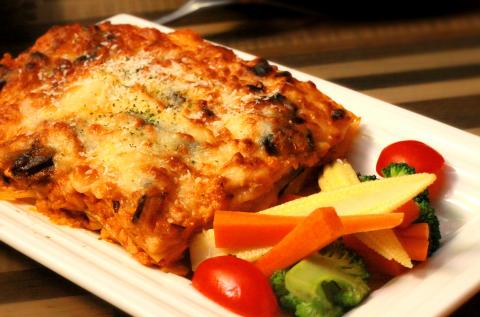
Photo: Olivia Wycech
Firepower is present in most of the Thai dishes but in exactly the right proportions. The only dish that made someone at my table sweat was the raw shrimp with garlic and chili sauce (NT$300). The bite-sized morsels have some serious kick to them, but they are simultaneously bracing with a vivid citrusy sauce making it one of my favorites. While usually served dry and sparse, the handmade Thai shrimp pancake (NT$300) is made fresh to order and is delightfully springy while also being densely packed with shrimp.
The eggplant with Chinese basil in a clay pot (NT$280) was lacking in flavor compared to everything else we tried, making the fried tofu with garlic soy sauce (NT$220) a better veggie choice. The tofu sits marinating in a soup of savory soy sauce that’s saturated with onions, chili, and garlic, and is best eaten atop rice so you don’t waste a single drop of such a palatable sauce.
The Thai-style steamed sea bass with lemon sauce (NT$380) came served still broiling over a flame, the fish lavished with cilantro and swimming in a pool of lemon soup that gives the dish its zing. The fish is tender and fell apart before it even hit my mouth and I had to scoop it up with a spoon. This was a table favorite on both occasions.
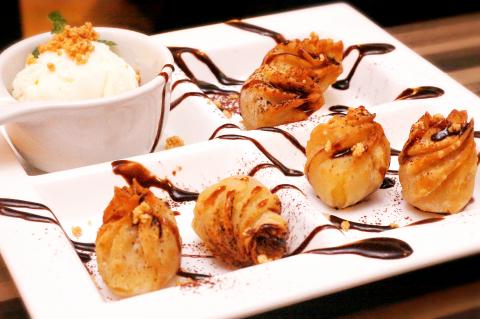
Photo: Olivia Wycech
Fusion is always fun because blending the best of different cultures can yield pleasant surprises. I could not stop talking about the red curry with coconut milk lasagna (NT$260). Rather than tomato sauce, this Italian style dish is given a Thai treatment by layering chicken and eggplant in a rich red coconut curry sauce.
It was hard to choose from the many types of meat, but on my first trip I went on the servers recommendation and tried the grilled sirloin beef (NT$280). The thinly sliced delicate slices of beef came served with a lemon grass sauce for dipping, but only because I asked for it, which was more inspiring than the red hot pepper chicken (NT$320) I had on my second trip. By comparison, it was again just one of the dishes that lacked much depth, but the heaps of fried garlic and chilies that are strewn about the dish wakes it up.
It is culturally encouraged to share all your dishes, so order as many as fit on the table, but leave one spot for dessert and try the sweet deep fried dumplings (NT$220). There are six in total and are stuffed with bananas, chocolate, and apples.
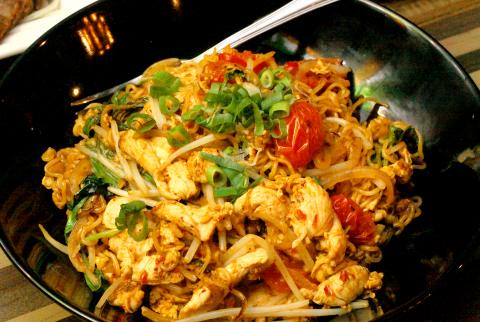
Photo: Olivia Wycech
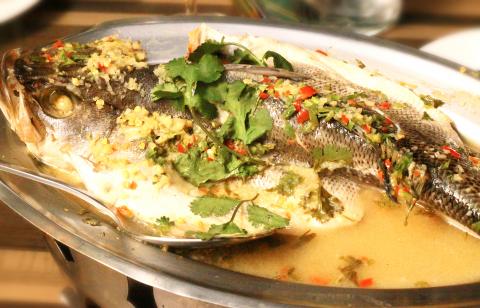
Photo: Olivia Wycech
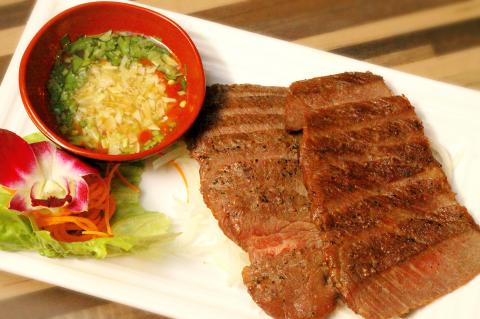
Photo: Olivia Wycech Photo: Olivia Wycech

April 28 to May 4 During the Japanese colonial era, a city’s “first” high school typically served Japanese students, while Taiwanese attended the “second” high school. Only in Taichung was this reversed. That’s because when Taichung First High School opened its doors on May 1, 1915 to serve Taiwanese students who were previously barred from secondary education, it was the only high school in town. Former principal Hideo Azukisawa threatened to quit when the government in 1922 attempted to transfer the “first” designation to a new local high school for Japanese students, leading to this unusual situation. Prior to the Taichung First

The Ministry of Education last month proposed a nationwide ban on mobile devices in schools, aiming to curb concerns over student phone addiction. Under the revised regulation, which will take effect in August, teachers and schools will be required to collect mobile devices — including phones, laptops and wearables devices — for safekeeping during school hours, unless they are being used for educational purposes. For Chang Fong-ching (張鳳琴), the ban will have a positive impact. “It’s a good move,” says the professor in the department of

On April 17, Chinese Nationalist Party (KMT) Chairman Eric Chu (朱立倫) launched a bold campaign to revive and revitalize the KMT base by calling for an impromptu rally at the Taipei prosecutor’s offices to protest recent arrests of KMT recall campaigners over allegations of forgery and fraud involving signatures of dead voters. The protest had no time to apply for permits and was illegal, but that played into the sense of opposition grievance at alleged weaponization of the judiciary by the Democratic Progressive Party (DPP) to “annihilate” the opposition parties. Blamed for faltering recall campaigns and faced with a KMT chair

Article 2 of the Additional Articles of the Constitution of the Republic of China (中華民國憲法增修條文) stipulates that upon a vote of no confidence in the premier, the president can dissolve the legislature within 10 days. If the legislature is dissolved, a new legislative election must be held within 60 days, and the legislators’ terms will then be reckoned from that election. Two weeks ago Taipei Mayor Chiang Wan-an (蔣萬安) of the Chinese Nationalist Party (KMT) proposed that the legislature hold a vote of no confidence in the premier and dare the president to dissolve the legislature. The legislature is currently controlled